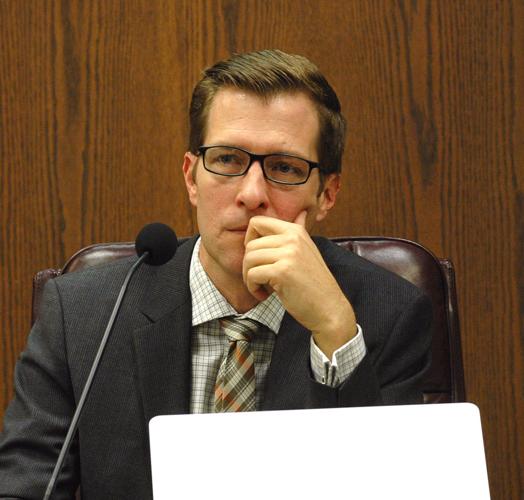Three years after being rebuffed by the Arizona Supreme Court, Republican legislators are making another bid this week to tell local governments when they can have their elections.
But House Speaker J.D. Mesnard contends that this time lawmakers will convince the justices to let them do what they want. And the Chandler Republican is depending, at least in part, on some new verbiage to explain to the court why lawmakers are doing what they’re doing.
But Tucson City Attorney Mike Rankin, who successfully got the high court to void prior legislative attempts to tell cities how and when to run their elections, said this new effort will meet the same fate, no matter how lawmakers dress up HB 2604 with claims of justification.
Arizona law generally requires that elections be conducted only in even-numbered years, and only on four specific days. The premise behind that is the argument that consolidating all federal, state, local and school issues onto the same ballot improves turnout and saves local voters the cost of running a separate election.
In 2012, legislators voted to force the issue with cities that have been scheduling their elections as they wish. But that effort was voided by the state Court of Appeals which concluded — and the Supreme Court affirmed without comment — that when it comes to the state’s 19 charter cities, lawmakers have no power.
Appellate Judge Michael Miller, who wrote that decision, said Tucson and Phoenix presented valid arguments to keep their odd-year elections.
“An off-cycle election allows the city to obtain the full focus of the electorate,” he wrote. Miller said it also insulated the local elections from the “influence of partisan issues that are inevitably interwoven with federal, state and county elections.”
Miller said having separate city elections also ensures local candidates do not have to compete with state and national candidates for donations to get their messages out.
And there’s something else: There’s an even older precedent of the state’s high court voiding a different attempt to force Tucson to change how it elects its mayor and council members. The justices said the Arizona Constitution makes it clear that local elections are matters of strictly local concern and that residents of charter cities can pretty much decide how to run those elections.
Mesnard, however, thinks he’s found a loophole of sorts in those rulings: A claim for legitimacy in state intervention. It would put into law a declaration that having consolidated elections “is a matter of statewide concern to increase voter participation in elections.”
It also contains something not in the earlier version: a trigger. It would spell out that the mandate for consolidated elections would kick in only if there is a “significant decrease” in turnout in its off-year elections.
That would be computed by comparing the number of people who turn out for a local election with how many went to the polls in the same jurisdiction during two prior primary or general elections.
If that drop off is 25 percent, the city loses its right to have elections on its own schedule.
Mesnard said there is precedent for this plan, saying it has been enacted in California.
But Rep. Ken Clark, D-Phoenix, said one flaw is how the numbers are computed.
The comparison would be the number of people who turn out for a statewide election, with the president or governor at the top of the ballot. But he pointed out that local races are all the way at the bottom.
There is evidence of “ballot fatigue” even in statewide races.
In 2014, for example, the Secretary of State’s Office reports there were 1.5 million ballots cast. But fewer than 90 percent of those people voted on Proposition 122, which was at the bottom of the statewide ballot.
The situation is even more pronounced in that year’s primary, with nearly 870,000 Republicans and Democrats casting ballots in the gubernatorial race near the top of the ballot — and fewer than 483,000 weighing in on the treasurer’s race at the bottom.
Mesnard said he doesn’t buy that argument — or even the concept.
“It implies that people get weary making it to the end of a ballot,” he said. But Mesnard said if they’re skipping those races, “It’s probably because they have less interest, less vested concern, don’t know who they are.”
The other problem, said Clark, is Mesnard’s legislation goes only one way: Nothing allows a city to reclaim its own elections if it turns out that voting for local offices in a forced consolidated election actually turns out more than the odd-year contest.
Mesnard said having that kind of back and forth would be “legally problematic.”
Clark also said if Mesnard and Republicans are so interested in improving voter turnout, as they claim, they should require the secretary of state to research how other states are working to improve voter participation and report back to the Legislature. Clark said that could include things like registering people to vote automatically when they get a state driver’s license, as Arizona law requires proof of legal presence to get that document.
“If we were truly trying to fix the problem, then we would look at other states that have higher voter turnout,” he said.
He persuaded members of the House Government Committee to include that language. But Mesnard said he won’t include that in the bill when it goes to the full House, saying he wants to keep HB 2064 simple.
Mesnard is resigned about going back to court.
“I assume this bill will trigger a lawsuit,” he said.
Rankin said he can count on it, citing the two prior court rulings siding with cities — and against the state. And he said none of that will change, even with all the new verbiage Mesnard hopes will make the third time a charm.
“The law of the land right now is local elections are a local concern,” he said.







